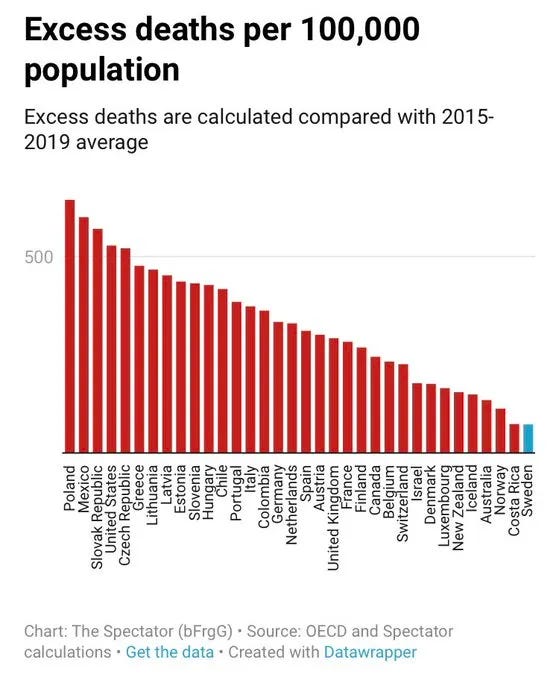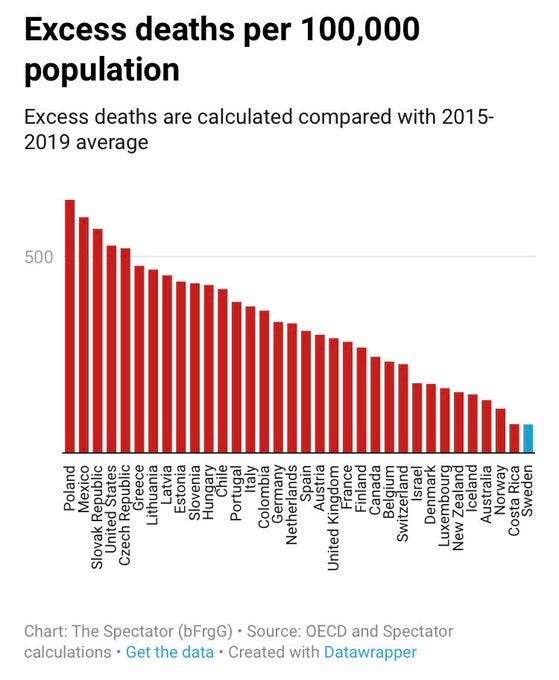It's 2024, and science still shows many demonstrated harms and no demonstrated benefits from lockdowns during COVID-19
A brief overview of what the scientific research shows
Despite celebrated claims that lockdowns were helpful, there is conflicting evidence that they have had any long-term benefit. As mentioned, some publications suggest that lockdowns and other pandemic restrictions may have in some countries increased deaths. The mechanisms likely vary from country to country and depend on pre-existing sociopolitical vulnerabilities. And this makes sense: what sorts of health problems a person has can exacerbate the adverse events of a medicine. But it depends on the person, and it depends on the precise nature of the pre-existing health problems. The same is true of a large-scale, society-wide intervention: some societies may tolerate the intervention just fine, while others may suffer immensely owing to pre-existing sociopolitical vulnerabilities.
The following figure plotting excess deaths from 2020-23 published by the UK newspaper The Spectator makes clear:
Indeed, in 2020, Sweden provoked international consternation when its public health establishment, led by Anders Tegnell, refused to lockdown. But by 2023, it had pulled ahead of almost all other countries in having among the lowest excess mortality rates–deaths beyond what was expected based on projections from previous years–over the course of the pandemic. Sweden showed that it was possible to avoid lockdowns but also have a remarkably low death rate. Sweden showed, in a word, that lockdowns had almost nothing to do with pandemic outcomes: other factors were overwhelmingly more important, and Sweden had them in spades.
Other, similar data may put Australia or New Zealand marginally ahead of Sweden. The point is, however, that some countries that had harsh lockdown policies did very similarly to other countries with very liberal policies: the policies themselves were therefore not what made the difference, or if they did, the impact of the policies were overwhelmed by the impact of other factors. To wit, the difference between Australia, New Zealand, and Sweden, on the one hand, and Peru and the United States, on the other, is far greater than the difference between any of the first three between themselves: lockdowns therefore cannot be an important operative variable in determining long-term outcomes with respect to excess deaths in a country during the pandemic years and those immediately following.
Similarly, a study in the Lancet showed the same thing in the United States at a state level: no relationship between COVID deaths and stringency of pandemic measures. This can also be seen when comparing California to Florida: although California’s pandemic policies were among the most stringent in the United States and Florida’s among the least stringent, Florida actually had lower excess mortality than California.
As a recent editorial in New York Magazine put things:
The weight of the evidence seems to be with those who say that lockdowns did not save many lives. By our count, there are at least 50 studies that come to the same conclusion.
The same piece quotes Michael Osterholm, a public health expert at the University of Minnesota, who speaks with great clarity:
There is actually no role for lockdowns,” [Osterholm] says. “Look at what happened in China. They locked down for years, and when they finally relaxed that effort, they had a million deaths in two weeks.” As for flattening the curve, “that’s not a real lockdown,” Osterholm says. “You’re just reducing contact for a few weeks to help the hospitals.”
Lockdowns had other harms. In some countries, they may have in fact increased deaths by reducing engagement with healthcare services–such as cancer screening, management of cardiovascular disease and diabetes, etc.–and by further destabilizing already vulnerable social dynamics (as occurred via the depolicing due to the 2020 Black Lives Matter protests, which were arguably only possible at that scale as a form of displaced lockdown protest).
If lockdowns indeed had no benefits and only harms, it is likely that millions if not tens of millions of people vanquished because of lockdowns, with little benefit, a rate of death on par with the famines caused by the takeover of Soviet agriculture by the pseudoscience of Lysenko. As an added bonus, lockdowns destabilized the economy, leading to the current inflation we are now experiencing.
Today politicians and public health officials pretend that they never promoted lockdowns.
It is not hard to understand why.




Actually, there was one benefit. Sudden infant deaths dropped. Hmmmm….